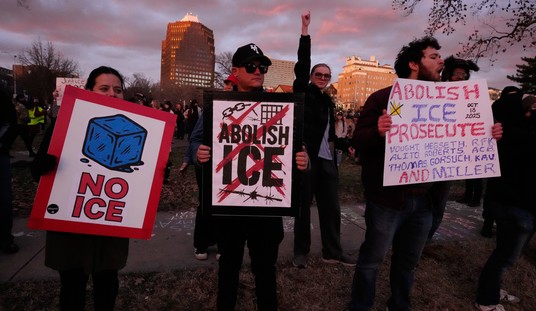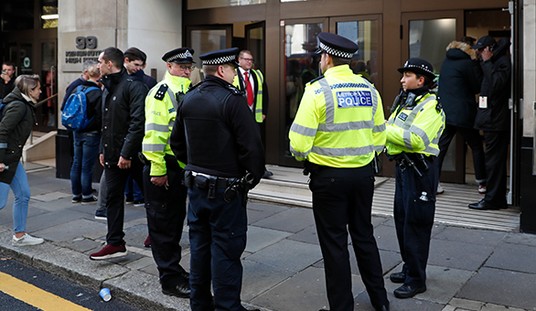Has Pope Francis become a “lonelier figure” lately, and has Stephen Bannon positioned Donald Trump to supplant the pontiff as the primary Fidei Defensor? The New York Times’ Jason Horowitz has an intriguing backgrounder on Bannon and his at-times outspoken conservative beliefs in Catholicism, but the headline promises a little more than it delivers. It asserts that Bannon will “carry battles” to the Vatican, but offers little evidence that those issues are on Bannon’s plate, let alone Trump’s:
While Mr. Trump, a twice-divorced president who has boasted of groping women, may seem an unlikely ally of traditionalists in the Vatican, many of them regard his election and the ascendance of Mr. Bannon as potentially game-changing breakthroughs.
Just as Mr. Bannon has connected with far-right parties threatening to topple governments throughout Western Europe, he has also made common cause with elements in the Roman Catholic Church who oppose the direction Francis is taking them. Many share Mr. Bannon’s suspicion of Pope Francis as a dangerously misguided, and probably socialist, pontiff.
Until now, Francis has marginalized or demoted the traditionalists, notably Cardinal Burke, carrying out an inclusive agenda on migration, climate change and poverty that has made the pope a figure of unmatched global popularity, especially among liberals. Yet in a newly turbulent world, Francis is suddenly a lonelier figure. Where once Francis had a powerful ally in the White House in Barack Obama, now there is Mr. Trump and Mr. Bannon, this new president’s ideological guru.
I’ve only talked with Bannon a few times at best, and Catholicism wasn’t among the topics, although it might be interesting to have that discussion with him. Horowitz does a good job of laying out Bannon’s public positions on the direction of the Catholic Church, including a brief quote from almost a year ago criticizing Pope Francis for ignoring the fears of Europeans over mass migration from the Middle East, and wondered whether the pontiff had become too much of an elitist to comprehend the shifting political winds. That was certainly a trend Bannon understood when he joined Team Trump, better than many others.
However, there’s not much in Horowitz’ otherwise intriguing backgrounder to suggest that Bannon is making a fight with the Vatican one of the top priorities of the new administration, or even a goal at all. Most of the article focuses on Bannon’s alliance with Cardinal Raymond Burke, a leader of conservative Catholicism who has recently been implicitly rebuked by Francis in the Knights of Malta crisis, but all of that dates back to 2014 — well before Bannon joined Trump.
The tenor of the article also suggests that Bannon is on the extreme end of conservative within Catholicism, but that’s hardly the case, at least from the evidence presented here. There are strains that are much more conservative, especially the sedevacantists who reject all popes since 1958, and the SSPX sect with which Francis is negotiating a reconciliation. Bannon’s Burke-wing conservatism is a rather mainstream version that has always been in tension with the more liberal-progressive wing of Catholicism, both here and abroad. That also emerged during the 2014 Extraordinary Synod on the Family, but the Vatican remained standing nonetheless.
Besides, Bannon would almost certainly understand that injecting the Trump administration into a philosophical and theological debate within the church would be a mistake. His previous comments on this came when Bannon was a New Media activist, which is a legitimate platform for that kind of commentary and calls for action within the church. Government is an entirely different platform, one that would generate a lot of concern over the intrusion of American politicians into church business. Apart from that, Bannon and Trump will also have their hands full enough in shifting American policy rather than getting involved in the internal politics of the Vatican and the interpretation of Catholic doctrine.
We still don’t know who Trump will pick for the Vatican ambassador post, but the two names floated out over the last couple of weeks don’t sound like Team Trump is looking to pick a fight with the Pope, at least not in the Francis-Burke context. Both Callista Gingrich and Bill Simon come from the donor-elite class that would offer the traditional kind of diplomatic contact that relies on presidential access, a sign of a friendly-but-lower-priority view of the Washington-Vatican relationship that hardly hints at the motives suggested by the NYT’s Horowitz. They aren’t the kind of academics-activists one would need to credibly address the doctrinal debates, let alone have standing to insert themselves into those as American envoys, even if that were appropriate. What Trump needs from an ambassador is an envoy who has kept up with all of these issues and has some understanding of the tensions and the players, who can then judge those winds to present American policy best to the Vatican and can also best represent the administration to 70 million American Catholics.
Anything’s possible, of course, and we’ll know more as we see the diplomatic team assigned to the US embassy in Rome (Barack Obama moved it out of the Vatican in 2015). For now, though, Horowitz’s article should be read as a good basis for later analysis, or at least to get a little better picture of Bannon and his approach to the world.
Update: I originally saw this story via Jake Tapper, and he reminded me of this moment from a year ago when Trump pushed back at Pope Francis over Trump’s policies on immigration, especially the wall. That certainly got heated, but both sides almost immediately de-escalated the war of words shortly thereafter. That skirmish took place on the battlefield of American politics, not Catholic theology and practice. None of my analysis above is intended to suggest that Trump won’t respond when criticized — in fact, that’s a dependable pattern — but that Team Trump isn’t likely to get involved in Vatican politics or take Pope Francis into account except when it suits them. That’s not a novelty in American presidential politics, either.








Join the conversation as a VIP Member